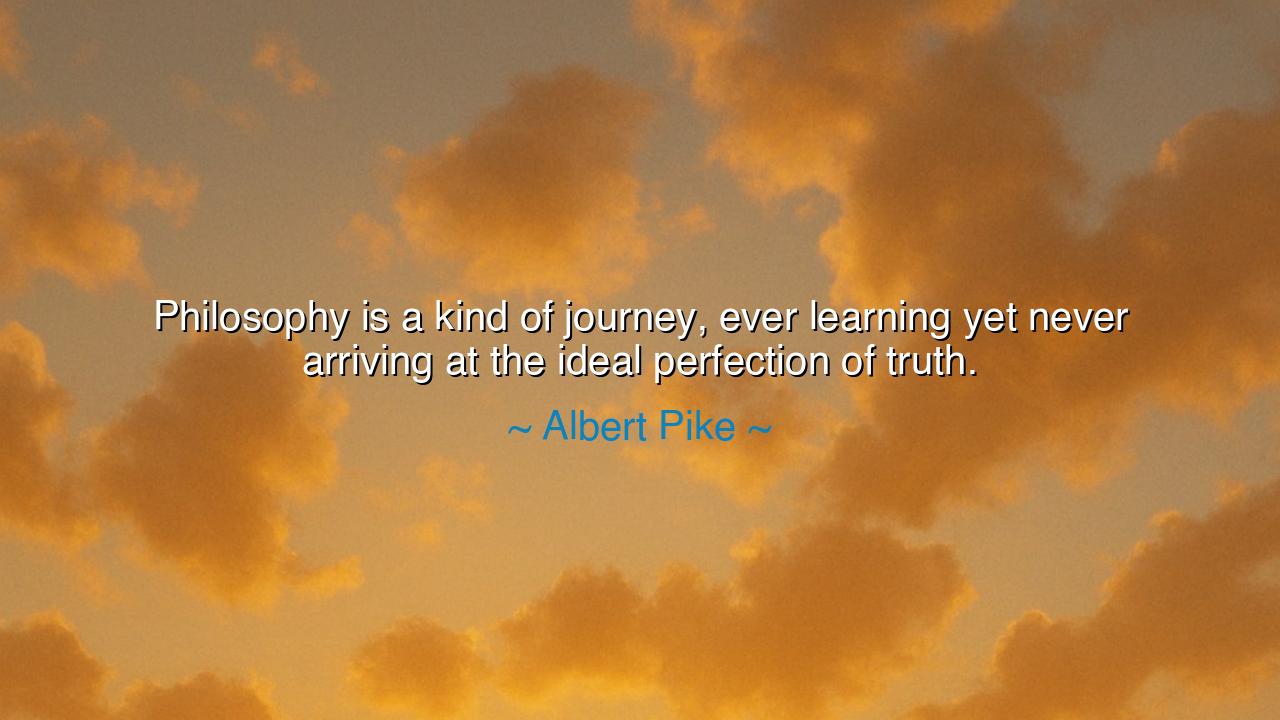
Philosophy is a kind of journey, ever learning yet never arriving
Philosophy is a kind of journey, ever learning yet never arriving at the ideal perfection of truth.






There are some truths so profound that they echo through every age, unbound by time or tongue. Among them are the words of Albert Pike, who wrote: “Philosophy is a kind of journey, ever learning yet never arriving at the ideal perfection of truth.” In this single phrase lies the essence of the human quest for wisdom — the eternal pilgrimage of the mind and soul toward understanding. It is a reminder that truth, like the horizon, forever recedes as we approach it, inviting us to move onward with humility and wonder.
The meaning of Pike’s words is both simple and vast. To study philosophy — or indeed to live wisely — is to accept that the truth cannot be possessed as a final treasure, but only glimpsed through constant learning and reflection. The wise man knows that knowledge is infinite, and that each answer opens the door to deeper questions. Philosophy is not a fortress of certainties, but a road without end, stretching through the landscapes of thought, ethics, and being. Those who walk this road do not seek to conquer truth, but to dwell with it, to shape their lives according to its unfolding light.
The origin of Pike’s insight lies in the great lineage of seekers who came before him. He drew from the ancient mysteries, from Plato and Pythagoras, from the sages who saw that the divine spark within man hungers for wisdom yet can never contain it fully. Plato taught that the soul remembers fragments of truth from its journey beyond the stars but can only rediscover them through learning and contemplation. Every philosopher since has inherited this paradox — that to be truly wise is to know how little one truly knows. Pike, steeped in this ancient wisdom, saw philosophy as a sacred journey of becoming — a movement not toward an end, but toward a continual deepening of the soul’s perception.
Consider the life of Socrates, that eternal teacher of Athens. He called himself ignorant, yet his questions changed the world. He spent his life in dialogue, uncovering contradictions, exposing false certainties, guiding others to see that wisdom is born in humility. When condemned to death, he met his fate calmly, saying that death itself was but another journey — either a dreamless sleep or a new realm of discovery. Socrates embodied the very spirit of Pike’s words: ever learning, never arriving. His life was not a monument to truth achieved, but to truth pursued with courage and sincerity.
This endless search is what gives philosophy its sacred power. To seek truth without expectation of mastery is to live in harmony with the divine rhythm of existence. The stars themselves move in infinite circles; the sea never ceases its waves; so too must the mind of man remain in motion. Those who believe they have found the final truth become rigid, lifeless — their journey has ended, and with it, their growth. But those who continue to question, to reflect, to learn — they live as the ancients lived, walking hand in hand with mystery.
In a modern world obsessed with answers, Pike’s teaching stands as a quiet rebellion. We are surrounded by noise, by claims of certainty and instant knowledge. Yet wisdom does not shout; it whispers through the discipline of contemplation. The philosopher, the scientist, the artist — all who create and inquire — must learn to love the journey itself more than the destination. For it is not arrival that transforms us, but the striving, the seeking, the refining of mind and character along the way.
Let this teaching, then, be your companion through life: embrace the journey of learning as a sacred act. Do not fear uncertainty; it is the sign that you are alive to truth. Read deeply, reflect often, listen humbly, and allow wonder to guide you. As Pike reminds us, the perfection of truth is not a point to be reached but a light that calls us onward. To walk toward it — patiently, reverently, with open eyes — is the highest calling of the human spirit. For though the wise may never arrive, their journey itself becomes the very embodiment of truth.






AAdministratorAdministrator
Welcome, honored guests. Please leave a comment, we will respond soon